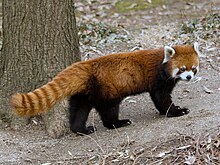Lesser panda
| Red panda | |
|---|---|
 |
|
| At the Cincinnati Zoo and Botanical Gardens | |
| Scientific classification | |
| Kingdom: | Animalia |
| Phylum: | Chordata |
| Class: | Mammalia |
| Order: | Carnivora |
| Suborder: | Caniformia |
| Family: | Ailuridae |
| Genus: |
Ailurus F. Cuvier, 1825 |
| Species: | A. fulgens |
| Binomial name | |
|
Ailurus fulgens F. Cuvier, 1825 |
|
| Subspecies | |
|
A. f. fulgens F. Cuvier, 1825 |
|
 |
|
| Range of the red panda | |
A. f. fulgens F. Cuvier, 1825
A. f. styani Thomas, 1902
The red panda (Ailurus fulgens), also called the lesser panda, the red bear-cat, and the red cat-bear, is a mammal native to the eastern Himalayas and southwestern China. It has reddish-brown fur, a long, shaggy tail, and a waddling gait due to its shorter front legs; it is slightly larger than a domestic cat. It is arboreal, feeds mainly on bamboo, but also eats eggs, birds, and insects. It is a solitary animal, mainly active from dusk to dawn, and is largely sedentary during the day.
The red panda has been classified as Endangered by the IUCN because its wild population is estimated at less than 10,000 mature individuals and continues to decline due to habitat loss and fragmentation, poaching, and inbreeding depression, although red pandas are protected by national laws in their range countries.
The red panda is the only living species of the genus Ailurus and the family Ailuridae. It has been previously placed in the raccoon and bear families, but the results of phylogenetic analysis provide strong support for its taxonomic classification in its own family Ailuridae, which, along with the weasel, raccoon and skunk families is part of the superfamily Musteloidea. Two subspecies are recognized. It is not closely related to the giant panda.
...
Wikipedia

